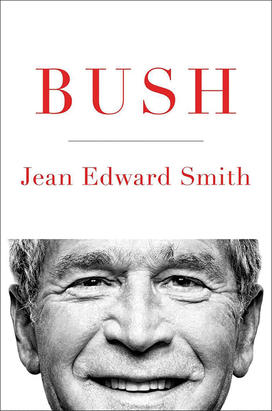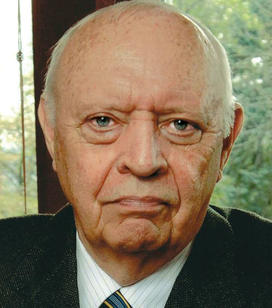
Jean Edward Smith ’54 — biographer of Ulysses S. Grant, Franklin D. Roosevelt, and Dwight Eisenhower — has written his latest book about a president who offers a relatively fresh canvas: George W. Bush.
Bush (Simon & Schuster), published this summer to positive reviews, is at times acidic — take, for example, the book’s first sentence: “Rarely in the history of the United States has the nation been so ill-served as during the presidency of George W. Bush.” Smith calls the wars in Afghanistan and Iraq “disastrous wars of aggression,” asserting that the Iraq war will “likely go down in history as the worst foreign-policy decision ever made by an American president.”

Smith argues that, contrary to popular belief, responsibility for the post-9/11 wars lies not with Vice President Dick Cheney and Defense Secretary Donald Rumsfeld ’54, but rather with “direct decisions of the president.” At first, Bush depended heavily on Cheney, “but after 9/11, that changed,” Smith says in an interview. “Bush became commander in chief, and the vice president was not in the chain of command.” Partly, Bush had become more comfortable with the job, but also “Bush honestly believed he was God’s agent here on Earth to fight evil. ... If you believe that, you don’t need vice presidential support.”
Smith grew up in Washington, D.C., the son of a barber and a legal secretary. At Princeton, he majored in politics, and he credits his senior thesis with teaching him to write with discipline. (Smith, 83, continues to write — in longhand — seven days a week, beginning at 5:30 a.m.)
Smith served several stints in the Army overseas and witnessed the construction of the Berlin Wall. The wall became the subject of his first book, The Defense of Berlin, which was published in 1963 before he began graduate school; the volume was retroactively accepted as his dissertation at Columbia.
Some critics have lamented that in assembling Bush, Smith relied too heavily on contemporary journalism and memoirs of the principal figures. Smith was unable to secure an interview with Bush, and among the major players, he interviewed only Cheney and Rumsfeld, Smith’s classmate.
Smith’s impression of Bush is that “he gets along with people fine. His deficiency is that he has a short attention span, and mentally he was not prepared for the foreign-relations aspect of the job.” Smith praises Bush’s willpower to overcome alcoholism and credits him with going out of his way to help smooth the transition to his successor, Barack Obama.
Smith also is impressed with Bush’s domestic-policy accomplishments — his No Child Left Behind education law; his Medicare prescription-drug expansion; and his actions, in concert with Obama, to reverse the economic tailspin through programs like the Troubled Asset Relief Program.
When Smith began his research, he says, Bush was considered by many to have been among the worst presidents ever. Now, a few years later during a 2016 presidential campaign that has relentlessly shattered norms of decorum, Smith says Bush is getting some benefit of the doubt. And at the very least, he says, “I think Bush has been an exemplary ex-president.”









No responses yet